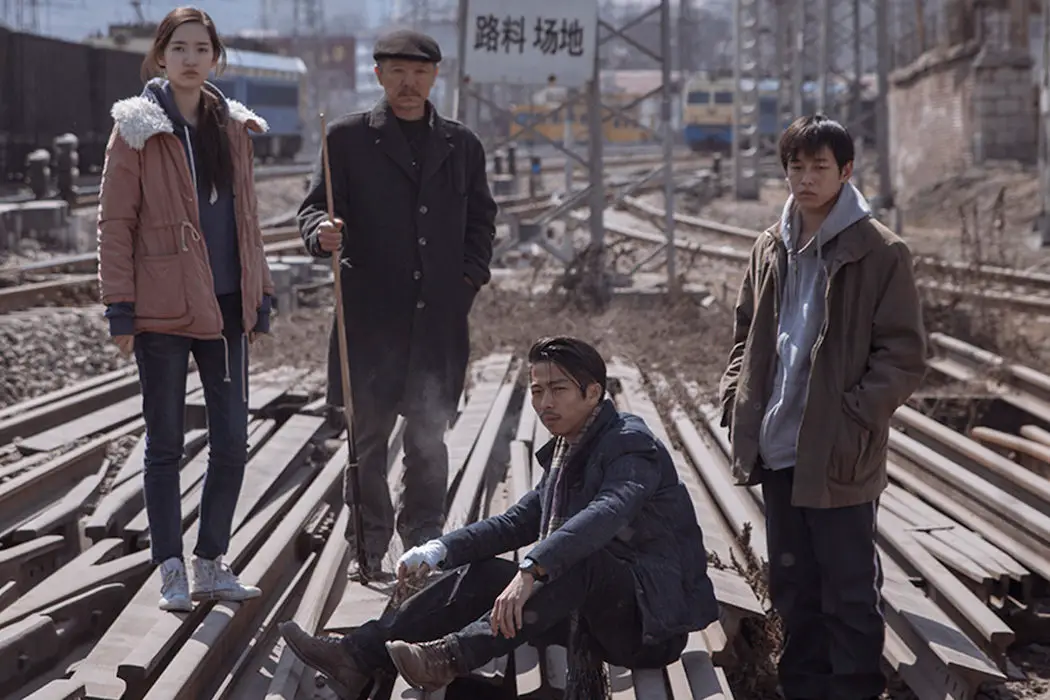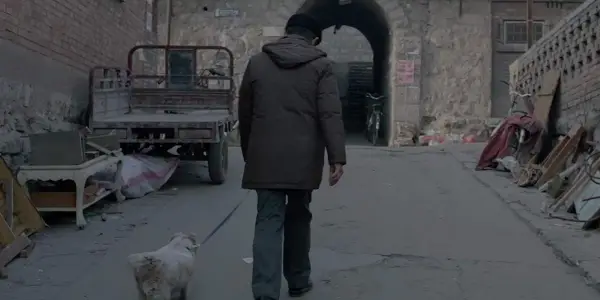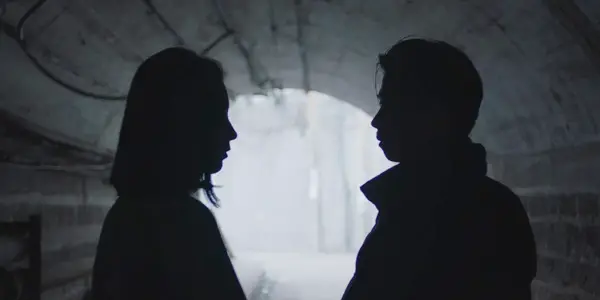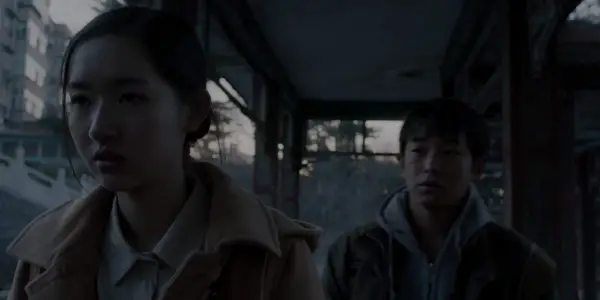AN ELEPHANT SITTING STILL: A Lyrical Tale Of Human Woe

Andrew Stover is a film critic/writer from the Chicagoland. His…
Hu Bo’s An Elephant Sitting Still is a hard-bitten and mournful feature debut that will be inevitably associated with the director’s suicide between the film’s completion and premiere at the Berlin International Film Festival in 2018. Brimming with sadness and hopelessness, it’s tempting to perceive the film as a suicide note. In reality, though, Hu’s directorial debut shouldn’t be extolled anymore than what’s delivered on-screen and how the vision is captured. The emotional resonance of Hu’s picture would have been impactful however Hu died. And even if Hu had the motivation to discreetly seal his fate in his first movie, there was clearly more to the guy than one piece of work. An Elephant Sitting Still may very well be a personal effort, a long-time achievement as well as a final goodbye, but there’s also the socioeconomic aspect of the film, which is by far bigger than any one man and involves many who are struggling to survive in modern China and beyond.
Despite its melancholia and tonal rigor, An Elephant Sitting Still exudes so much elegance, frame precision and ingenuity. Hu Bo’s first and last feature is destined to have a place in cinema. This 4-hour cinematic venture is helmed by a true director who ensured his creative work was accurately realized. Even when financiers tried to force Hu into cutting his runtime, he insistently and laudably refused. An Elephant Sitting Still is a mysterious and lyrical glimpse of utter despair, seen through the eyes of forlorn characters as they navigate through their dour, keenly claustrophobic surroundings. This prolonged journey doesn’t show signs of rot like the industrial town in northern China that takes deformed shape in Hu’s feature; a derelict town currently in a ceaseless plummet of entropy. And this grey-hued region seems to be a roaring, implacable hell for the four leading characters, whose disconnected endeavors end up merging in the timeline of one morbid and synchronized day.

Wei Bu (Peng Yuchang) is a timid teenager who radiates a stifled comportment and piercing stares that convey so much unspoken pain. Already enduring the verbal abuse of his father, who was fired from his job for taking bribes, Wei Bu isn’t able to find comfort at school. Obviously, this high school isn’t well-funded (not only are there signs of neglect but the aura is uncomfortably carefree), especially considering how the not-so-sapient guidance counselor proclaims the school’s imminent destruction with such vile ease and insolence (causally saying, “Our school is going to be demolished” and “You guys will go to the worst high school in the city”). When his friend is accused by a bully for stealing his phone, Wei Bu intervenes and sends the bully to the hospital, fleeing the scene, and inadvertently angering the bully’s older brother, Yu Cheng (Zhang Yu), a minacious criminal who, just earlier this day, was implicated in the suicide of his childhood friend.
Before Yu Cheng is even sent on a trek for vengeance, Yu Cheng was first seen in a bedroom with a woman. Through subtle pacing and unsure expectation, it isn’t long until Yu Cheng is exposed for cheating on his best friend’s wife when his friend hesitantly enters the room. No virulent discourse or fistfight occurs, instead, the friend leaps out the window, falling to his death and implicating Yu Cheng guilty of his friend’s irrevocable decision. It’s possible that Yu Cheng’s astounding guilt is being filtered through catching the person who put his brother in the hospital.
Seemingly close to Bu, Huang Ling (a fittingly steely Wang Yuwen) is somebody Bu enjoys the company of — she’s potentially one of the few people who can put a smile on his face. Huang Ling is also visibly dejected, wrestling with a dysfunctional relationship with her mother and a romantic relationship with the school’s married vice-dean (Xiang Ring Dong). What she isn’t aware of is that a video is circulating around which will bring her depraved affair to light. Wang Jin (Li Congxi) is an elderly man whose daughter and son-in-law urge him to move into a retirement home so they can raise their young daughter in comfort. The child and his little dog provide him much-needed mitigation of his isolation, but the dog is woefully killed by another mutt.
Eventually, these characters cross paths. In a town where jobs are exiguous, infrastructure is falling and academic success is loosely thought about, the people that plague these grubby streets are reacting in self-serving violence and decision-making, free from any morality. An Elephant Sitting Still highlights characters who don’t take responsibility for their actions, and it ends up benefiting from its visual and tonal severity.
Gritty Realism & Socioeconomic Exposition
Like I concisely stated above, An Elephant Sitting Still outlines faulty characters who do whatever they can to evade suspicion and blame. When Wei Bu first arrives on-screen, his quiet bearing and tired eyes persuade you he’s somebody you can empathize with. Peng Yuchang’s muted performance translates breathtakingly well through hard-edged stares and off-putting releases of anger. He passively watches those around him, weathers the parental and the bully’s abuse, and out of sheer instinct, pushes the bully down the stairs and attempts to bypass the implications of the incident — therefore not taking responsibility for his actions, accident or not.

As for Yu Cheng — a small-town gangster who wears a pencil mustache and a droopy forelock — he slept with his best friend’s wife, spurring the best friend to commit suicide. During a frustrating confrontation between Yu Cheng and his ex, we learn that Yu Cheng slept with his best friend’s wife because his own girlfriend had rejected him. In this case, Yu Cheng tries to force all of the blame onto his ex, which is rather sordid and harebrained. Yu Cheng channels all of this aggravation into catching Wei Bu. Zhang Yu’s superb performance as the strong-willed criminal Yu Cheng is unconventionally subdued. Yu Cheng wields a sufficient amount of fear and power, but he assumes a reserved demeanor.
For Huang Ling, she’s caught in an unethical affair with her married vice-dean, and the vice-dean tries to shove all of the condemnation onto her and thinks it’s absolutely outrageous his career should end because he slept with an underage student. And Wang Jin is an elderly man whose little dog is mauled by a big dog, and the dog owners of the killer dog are repulsively callous and acrid — again, not taking responsibility. Huang Ling and Wei Bu are victims of brutality and insensitivity, but there are times where they let loose. At one point, Wei Bu verbally attacks a bunch of old people, and Huang Ling finally tells off her mother in an uncut mother-daughter warring that’s immensely captivating. Wang Yuwen’s deadpan gaze and brittle frowns amplify this scene completely. But, beyond their caustic bile, Wei Bu and Huang Ling are still empathetic subjects, suppressed by a stony, unsustainable society. In one way or another, your environment affects you, whether it be financially, physically, mentally or emotionally.
While on a bus ride to somewhere, Wei Bu finds a flyer promoting the Mongolian city of Manzhouli, with an elephant on display in Manzhouli. Initially, Wei Bu and all of the coexisting characters live in a society without any authority that would bestow them any optimism: Adult progeny are eager to get rid of their parents for more space, parents harshly judge their kids, the school decides to deal with the bully’s injuries discreetly, the vice-dean doesn’t feel any remorse for the school closing, and Yu Cheng takes matters into his own hands. But this elephant, this fairly referenced elephant is a beacon of hope for Wei Bu to follow, in a valiant search for answers, and the reason for why he must suffer.

Narration opens the movie: “He told me the other day, there is an elephant in Manzhouli. It sits there all day long. Perhaps some people keep stabbing it with forks. Or maybe it just enjoys sitting there. I don’ know. People gather there, watching it sitting still. They feed the elephant food, but it takes no notice.” The significance of the elephant is implied early on and is pushed aside as the distinguishable plot threads ignite their course. But as the bouts of violence and bitter confrontations continue, and keeping in mind the film’s conspicuous title, the elephant entices Wei Bu, and Yu Cheng in the long run, predominantly because the elephant is mired in a perplexing situation. All-day long, the elephant is quiescent, probed by visitors, and they want to see it with their own eyes. The elephant gives the characters hope that the elephant will somehow be at peace with itself and the situation, which is a direct parallel to how the characters are sufferers of cruelty and persecution in some fashion as well, will attest for hope outside of this tumbledown town. Pain can be withstood without getting discouraged.
Reality is, not all realities are pristine, and finely embedded with familial love and academic success. The gritty realism of Hu’s film is not only narratively potent (it neatly interweaves storylines into one coherent whole), but it’s also visually textured and inspired. In its greyness and dreariness, Hu deploys inspiration from Hungarian filmmaker Béla Tarr, who just so happened to be one of Hu’s teachers. The conversation of economic tribulation and how it summons arm-twisting entities that take shape in concrete and incorporeal incarnations is profoundly explored here. Everyone’s so self-regarding because there’s no foreseeable space for sympathy, not enough money and sustainability to procure, let alone share. Everyone’s depressed, cryptic and dubious about the future, as they should be. Sometimes it seems like all roads lead to suicide for these impecunious citizens. If that was the case, An Elephant Sitting Still would be one of the most depressing films — but believe it or not, the aspiration to see the elephant is a seed of optimism that’ll solely nurture the willful ones willing to take the leap.
A Commander Of Atmosphere & Concealment
Granted, most of the performances are self-effacing and unobtrusive, unlike the camerawork, which turns us into an obtrusive bystander. Cinematographer Fan Chao often frames two characters firmly in free-flowing close-ups, following the characters from behind. Utilizing shallow focus, the close-up shots outline the narrator’s perception, but usually, a vital detail lies in the background, deliberately distorted.
Hu Bo vivifies the chosen perspective by keeping crucial incidents out of view and letting us observe the character’s response. For instance, the man who jumps out the window isn’t explicitly seen (he flees the frame but we stay on Yu Cheng), and the small dog getting mangled by another dog isn’t explicitly seen; their corpses, however, are briefly seen whenever the camera oscillates from the subject’s face and lastly reveals the gory aftermath. Concealment helps viewers comprehend the recent eruption of barbarity or disorder from the character’s frame of reference.

The film’s atmosphere is built out of devastation and futility. Ingrained with a softened grey palette (where sunlight barely breaches through the clouds), and underscoring rickety buildings that assemble a desolate environment, Hu’s expressive visuals are spellbindingly prevalent. Hua Lun’s evocative score is soberly distinctive: the wispy sounds of piano, organ, and guitar are masterfully composed. Arranged by communicative close-up shots that linger long enough for us to scrutinize how the characters react, this bleak setting is captured from the leading characters’ perspective. By the time the stirring conclusion commences, these lost souls conflate into a married voice of perseverance or liberation (or the search for it, at least). Beneath its spiritual voidness, economically-driven violence and self-interest, and lack of affection, An Elephant Sitting Still is tailored with unadorned beauty and rich empathy.
Conclusion: An Elephant Sitting Still Is Unforgettable
Woefully, we lost a promising voice of cinema too soon from suicide. An Elephant Sitting Still is a marvelous achievement for world cinema that’ll be remembered greatly for its sympathetic, insightful and melancholically beautiful portrait of human anguish, often conveyed without many words. And the mesmerizing last shot will be the cherry on top when it comes to remembrance. Not only is the final shot naturalistically life-affirming, but the sound of an elephant goes off in the background — the sound of liberation, perhaps. The sound in the background simply leaves it open to more contemplation.
An Elephant Sitting Still is chiefly compiled by a compelling succession of brusque encounters, disheartened characters and scattered acts of savagery and depravity. In this decaying industrial town bereft of any natural wonder, jobs are scanty, education is misprized and the characters feel like their grim fates are already sealed by torment. Hu Bo’s plunge into a gorge of unabated woe, surprisingly kindles the essentiality of pain just by existing. Poetic and ample in philosophical reflection, An Elephant Sitting Still is unforgettable and scarring — and I’ll gladly endure these characters’ pain because I know I couldn’t live without pain either. No one can. An Elephant Sitting Still is an experiment of empathy and defiance, a successful one for that matter.
Have you seen An Elephant Sitting Still? What are your thoughts? Let us know in the comments!
An Elephant Sitting Still made its premiere at the Berlin International Film Festival on February 16, 2018. It gained a limited U.S. theatrical release on March 8, 2019. It will be released on DVD/Digital on December 10, 2019.
Does content like this matter to you?
Become a Member and support film journalism. Unlock access to all of Film Inquiry`s great articles. Join a community of like-minded readers who are passionate about cinema - get access to our private members Network, give back to independent filmmakers, and more.
Andrew Stover is a film critic/writer from the Chicagoland. His film & TV reviews can be found on Film Inquiry & Film Threat.













